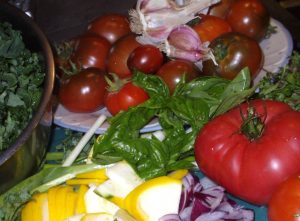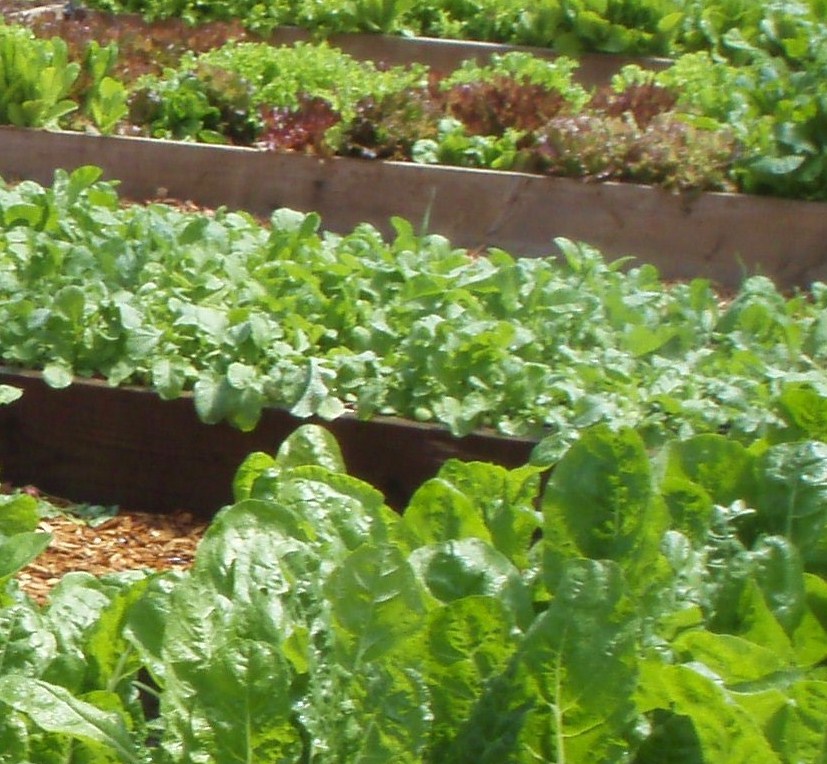Editor’s Note: With the current romaine lettuce recall, the most important take-away lesson here about food safety is simple: KNOW WHERE YOUR FOOD COMES FROM. Whenever possible, buy local, know your farmer (if possible) and most importantly, the source of your produce, meat and fish.

By Judith Yamada, Kitchen Maven
A local friend recently suggested I write an article about organic food facts, directed to our community, explaining why my recipes often call for organic ingredients, particularly when it comes to the produce. My friend is on a strict budget and realizes that many of our neighbors are in the same situation; unable to budget for more expensive organic choices at the local produce counter. I can attest that not everything we eat at the Kitchen Maven table is organic. There are brands I love (like Tillamook Dairy) that aren’t organic and there are items in all our kitchens that we buy out of habit or nostalgia. But the produce, at our table, is almost always organic or from farms using organic practices, even if they are uncertified or in transition. It’s something that’s important to me, and I’m in charge of groceries at this address.
The truth is, however, that if you or I were to hold a firm ripe apple, smell its bouquet and take a bite of the delicious flesh, it’s unlikely we’d be able to recognize whether it was grown organically or conventionally. They would taste about the same. And since organic produce typically costs more, why would any of us pay the difference for the organically grown variety? Even in many rural communities where farms are scattered, nearby, the cost of fresh food can be prohibitive. How can we choose the best possible food for our families without going broke? It’s essential to know the facts.
Organic farming refers to the methods used by farmers when growing and processing agriculture products such as fruit, vegetables, grains, dairy products and meats. Organic farming requires a special stewardship with the land to reduce pollution, enhance soil and water quality, allow livestock to live and graze in natural surroundings, to provide a comfortable healthy environment for livestock and to practice and support self-sustaining farm resources. Many organic farmers use companion planting and crop rotation methods to keep down disease and pest populations without resorting to the extreme methods used in conventional farming.
The following materials and practices are NOT allowed in organic farming, making organic farming more sustainable and wholesome for the land, animals and consumers.
• Synthetic fertilizers
• Most synthetic pesticides
• Sewage sludge for fertilizer
• Irradiation to preserve food or remove pests
• Genetic engineering
• Growth hormones or antibiotics in livestock
Of course, it’s always wise to purchase within our means. But it’s also important to eat the freshest and most wholesome foods we can afford and access. So here are the facts when it comes to choosing between organic and conventional produce.
Some conventional fruits and vegetables are less likely to be contaminated with pesticide residues. So you can feel pretty good about buying them and staying within your budget. But be aware that a small amount of conventionally grown sweet corn, papaya and summer squash, sold in the United States, comes from genetically modified seeds. Buy organic varieties of these crops if you want to avoid genetically modified produce.
The Environmental Working Group (EWG) is a non-profit, non-partisan organization dedicated to protecting human health and the environment. Each year the EWG identifies a “Dirty Dozen” list of conventional produce as well as a list of the “Clean 15” conventional produce options. Following is the “Dirty Dozen” list for 2018. These produce items contain the most pesticide residue and should be avoided and replaced with organic alternatives.

Dirty Dozen 2018
1. Strawberries
2. Spinach
3. Nectarines
4. Apples
5. Grapes
6. Peaches
7. Cherries
8. Pears
9. Tomatoes
10. Celery
11. Potatoes
12. Sweet Bell Peppers
Here is the EWG “Clean 15” list for 2018. These fresh conventionally grown foods reportedly contain the least pesticide residue, and are considered healthy inexpensive options.
Clean 15 for 2018
1. Avocados
2. Sweet corn
3. Pineapples
4. Cabbages
5. Onions
6. Sweet Peas
7. Papayas
8. Asparagus
9. Mangoes
10. Eggplants
11. Honey Dews
12. Kiwis
13. Cantaloupes
14. Cauliflower
15. Broccoli
Substituting organic produce for the high pesticide conventional “Dirty Dozen” would be a wise consumer decision for health and wellness. And still save some money by purchasing the less expensive conventional produce in the “Clean 15” list. Changing your grocery buying habits just a little can be a step toward providing your family with healthier food, while supporting organic agriculture and our environment.
Acknowledgments: Mayo Clinic, EWG 2018 Buyers Guide (ewg.org), Eatingwell.com


